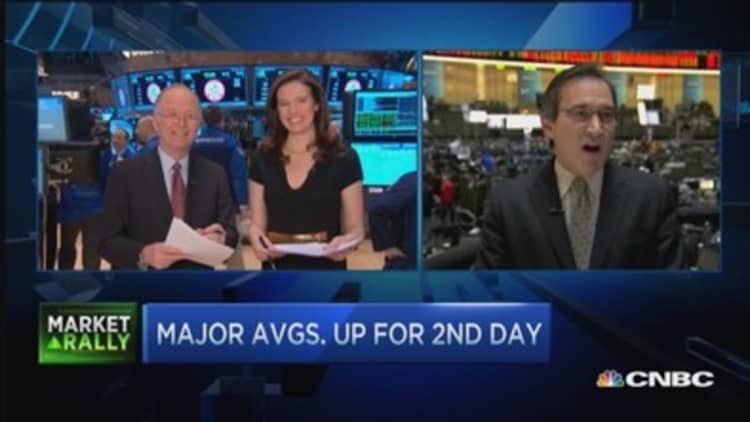
The last two day's oil gains are encouraging for the short term as investors continue to pick up more signs of coming stabilization in markets.
Oil extended the past few days' gains to settle up $3.48, a 7 percent surge, to $53.05 a barrel, the highest settlement of 2015. WTI crude is up 22 percent from its intraday low of $43.58 last Thursday.
"This is the first breath of up for energy," said Maris Ogg, president of Tower Bridge Advisors. "I don't think we'll have a 'v' bottom," expecting more of a soft landing. We're past the volatility peak here, she said.
The CBOE Volatility Index (VIX) fell below its 200-day moving average to trade below 18. The U.S. dollar also reversed its recent gains for much of the day, and the 10-year yield bounced from 1.66 to 1.78 percent.
Kingsview Asset Management portfolio manager Paul Nolte didn't think Tuesday's reversal in key market components represented a long-term positive trend, but he expects the market to moderate after the recent swings.
Read MoreWe haven't seen the worst in oil yet: Expert
"We're in the process of finding a bottom here," said Nolte. "I think the dollar will continue to strengthen, and yields and oil will continue lower. The pace of the decline trajectory has been so steep that those are not sustainable. Now that you get a little buying, you get these outsized gains."
U.S. stocks rallied on Tuesday to close up more than one percent higher in a second consecutive day of gains, boosted by a surge in oil prices and alleviation of concerns in the euro zone.
Greece's Finance Minister Yanis Varoufakis unveiled proposals on Monday to end the confrontation with its creditors by swapping outstanding debt for new growth-linked bonds, the Financial Times reported. On Tuesday, Varoufakis met with his Italian counterpart in Rome.
Read MoreOil expert: This is a 'dead cat bounce'
The Dow Jones industrial average surged 305.3 points in the last 15 minutes of trade to close up 1.76 percent at 17,666.40. All blue chips advanced, led by Caterpillar's nearly 4 percent gain. Exxon Mobil and Chevron followed, each rising nearly 3 percent or more.
The S&P 500 closed up 29.18 points, or 1.44 percent, at 2,050.03, with energy leading gains across all sectors. The Nasdaq closed up 51.05 points, or 1.09 percent, at 4,727.74.
Tuesday's gains came after a nearly 200-point surge in the Dow on Monday that recovered much of the index's 250-point drop last Friday.
"It's made a little tough that we have these giant moves every day," said JJ Kinahan, chief derivatives strategist at TD Ameritrade. "I think it will be difficult to follow through."
"You'd like to see a few days of consistency before you make the call," he said.
To be sure, despite regaining more than 70 percent of January's losses, the major indices are still down for the year. Consumer giants reporting after the bell on Tuesday gave a mixed picture of the U.S. economy, with Disney blowing past expectations and Chipotle disappointing analysts.
"I think you have to go through a couple of months without (big) events," Ogg said, before markets calm down.
Investors may get greater indications of the economy with Wednesday's kickoff to the week's employment reports. The ADP private sector payrolls come out at 8:15 a.m., which analysts see as a precursor to Friday's all-important jobs report.
"It's not a 100 percent positive correlation, but a robust number would give the market more confidence going into Friday morning," said Quincy Krosby, market strategist at Prudential Financial.
She is also watching Greek banks as an "important barometer for European markets for confidence."
Other economic data due on Wednesday include mortgage applications, the PMI services index and the ISM non-manufacturing index, all of which will contribute to the unfolding picture of the U.S. economy.
Read MoreHalftime trader: Here's an odd play on jobs growth
"We are seeing the very beginning signs of wage pressure and household formation. Really starting to feel more normal," Ogg said. "People have to be convinced that all these changes do not create a big black swan kind of event."


